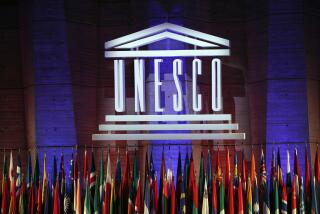U.S. Urges OECD to Broaden Its Focus, Mandate : Relations: At annual meeting in Paris, Mexico becomes the group’s first new member in 20 years.
- Share via
PARIS — Secretary of State Warren Christopher on Wednesday called on the Organization for Economic Cooperation and Development--often known as the West’s “rich man’s club”--to expand its vision and mandate to accommodate the post-Cold War world.
“We cannot allow new divisions to arise. Europe must not be split into zones of prosperity and poverty, stability and insecurity,” he said at the OECD’s annual ministerial meeting, where Mexico became the group’s first new member in more than 20 years.
By broadening its focus and membership, the OECD can coordinate economic progress at a time of accelerating change and help “more countries throughout the world enter the community of advanced industrial nations,” he said.
The speech was part of a broader U.S. effort to reassess and adapt the political and economic institutions created after World War II to the post-Cold War era, according to senior U.S. officials.
OECD membership is limited to democracies with market economies. But in a clear effort to encourage non-members, Christopher said, “An open, creative and dynamic OECD can help enlarge the community of free and prosperous nations throughout the world.” He specifically mentioned South Africa as well as Asian and Latin American regions.
Christopher’s speech came as the OECD opened membership negotiations with South Korea, which is expected to join as early as 1996, and the four East European countries of Hungary, Poland, Slovakia and the Czech Republic.
Also Wednesday, the OECD signed a cooperation agreement with the Russian federation to provide expertise to help build a market economy there. Eventually, the OECD will conduct a review of Russia’s economy, identifying what works and what doesn’t, and will offer training, technical and policy advice, U.S. officials said.
“Encouraging Russia’s integration with the West is the best investment we can make in our security and in the security of all the peoples of Europe,” Christopher said.
He said the actions taken by the OECD this year are historic ones that would have been unimaginable five years ago. But Christopher warned that the “scourges” of “hunger, poverty, despotism and chaos” that once plagued postwar Western Europe are still vivid elsewhere, notably in the former Yugoslavia, and threaten other areas such as the former Soviet republics.
“It continues to be in the interest of the world’s advanced industrial democracies to help ensure that dislocation does not lead to disillusionment with democratic institutions and free markets,” he said.
The OECD is also expected to initiate talks with China about global trade issues, U.S. officials said. But any form of membership for Beijing is still remote.
More to Read
Sign up for Essential California
The most important California stories and recommendations in your inbox every morning.
You may occasionally receive promotional content from the Los Angeles Times.












